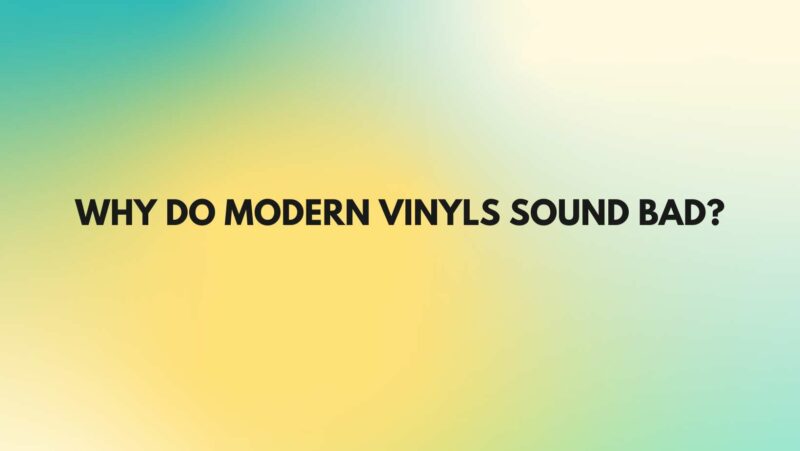Vinyl records have enjoyed a resurgence in popularity in recent years, with music enthusiasts drawn to their analog warmth and tactile appeal. However, some audiophiles and vinyl aficionados have voiced concerns about the sound quality of modern vinyl records, often finding them to be subpar compared to vintage pressings. In this comprehensive article, we will explore the reasons why modern vinyl records may sometimes sound less impressive and what factors contribute to this phenomenon.
- Digital Source Material
One of the key factors influencing the sound quality of modern vinyl records is the source material. Many modern vinyl releases are sourced from digital recordings, such as CDs or digital masters, rather than analog tapes. When analog audio is converted into a digital format and then back to analog for vinyl pressing, there can be a loss of warmth and depth that is inherent to analog recordings.
Solution: Seek out vinyl releases that are mastered from analog tapes whenever possible. Look for labels that prioritize analog source material.
- Overcompression and Loudness Wars
The loudness wars, a phenomenon in the music industry where tracks are heavily compressed to maximize loudness, have also affected vinyl releases. Excessive compression can result in reduced dynamic range and a loss of detail in the music. When these overcompressed tracks are pressed onto vinyl, the limitations of the medium can further exacerbate these issues.
Solution: Opt for vinyl releases that prioritize dynamic range and transparency. Some audiophile labels prioritize quality over loudness.
- Quality Control Issues
Modern vinyl production can sometimes suffer from quality control issues. Mass production and the demand for vinyl have led to some pressing plants cutting corners, which can result in defects, surface noise, and pressing variations.
Solution: Research pressing plants and labels known for their quality control. Online forums and reviews can be valuable resources for identifying reputable sources.
- Inferior Pressing Materials
Modern vinyl records may not always use the highest-quality materials. Some may be pressed using recycled vinyl or lower-grade materials, leading to a noisier listening experience and a perception of lower fidelity.
Solution: Look for records pressed with virgin vinyl, which tends to offer better sound quality and durability.
- Limited Mastering Expertise
The art of vinyl mastering is highly specialized, and not all mastering engineers have extensive experience with vinyl. Inexperienced mastering engineers may not optimize the audio for vinyl playback, resulting in subpar sound quality.
Solution: Seek out vinyl releases that credit experienced mastering engineers known for their expertise in vinyl mastering.
- Environmental Factors
Environmental conditions during production and storage can also affect the sound quality of vinyl records. Extreme temperature and humidity fluctuations during storage can lead to warping, and inadequate quality control in pressing plants can result in contaminants in the vinyl.
Solution: Store your vinyl records in a stable environment with controlled temperature and humidity levels. Be cautious when purchasing records from less-regulated sources.
Conclusion
While modern vinyl records certainly have their merits, they are not immune to issues that can affect sound quality. Factors such as digital source material, overcompression, quality control, pressing materials, mastering expertise, and environmental conditions all play a role in how modern vinyl records sound. To ensure a satisfying vinyl listening experience, it’s essential to be discerning when purchasing vinyl, prioritize releases that prioritize quality, and pay attention to factors that affect sound quality. With the right choices and careful consideration, modern vinyl can still deliver a highly enjoyable and authentic listening experience.


